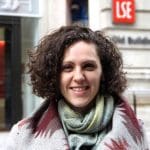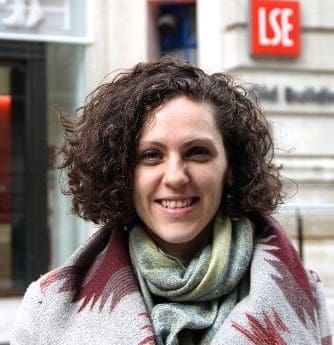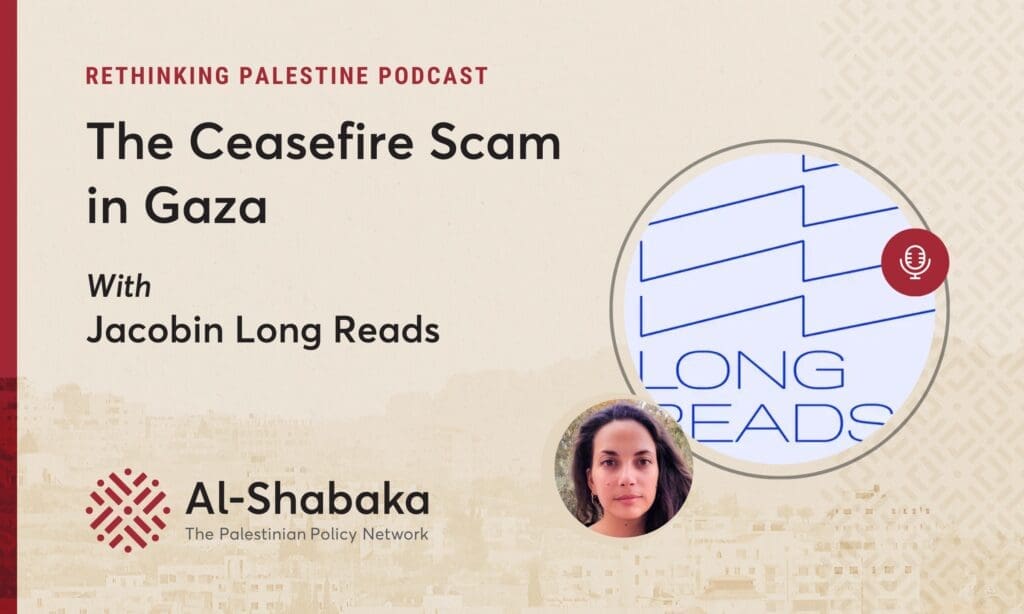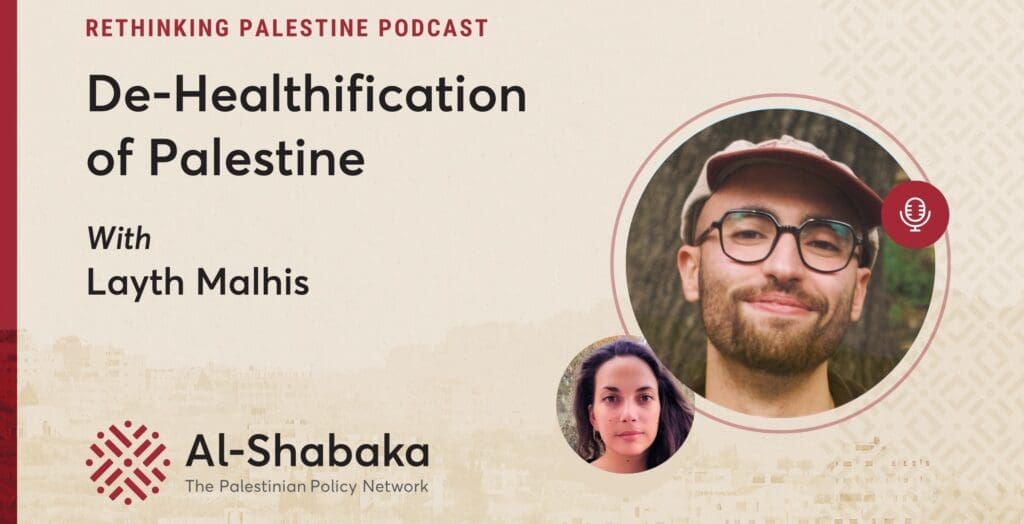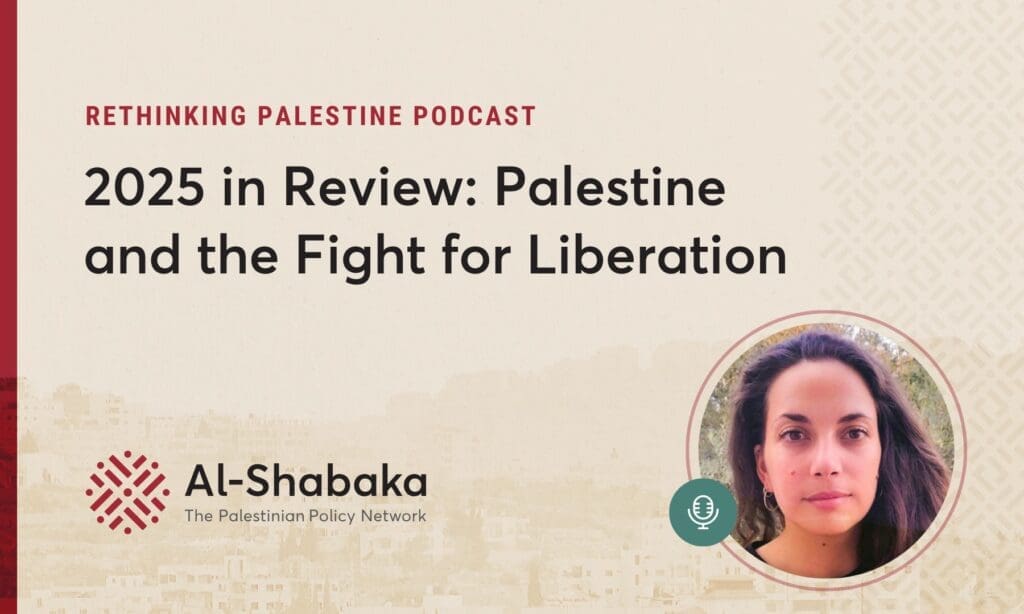About This Episode
Episode Transcript
The transcript below has been lightly edited for brevity and clarity.
Muna Dajani 0:00
Sheikh Jarrah symbolizes how refugees managed to exercise some form of return — by establishing roots again, in a place in Palestine, and calling it home — only to be under the threat of losing that refuge and that place, only a few years after moving into it and feeling like we can actually build our lives again.
Yara Hawari 0:28
This is Rethinking Palestine, a podcast from Al-Shabaka, the Palestinian Policy Network. We are a virtual think tank that aims to foster public debate on Palestinian human rights and self-determination. We draw upon the vast knowledge and experience of the Palestinian people, whether in Palestine or in exile, to put forward strong and diverse Palestinian policy voices. In this podcast, we will be bringing these voices to you so that you can listen to Palestinians sharing their analysis wherever you are in the world.
The ongoing Palestinian uprising against Israeli settler colonial rule across Palestine has been described as having begun in Sheikh Jarrah, the now well-known Palestinian neighborhood in Jerusalem facing ethnic cleansing. Now, it’s a bit reductive to say that this is entirely the case, because it ignores decades of attempts to mobilize and unify the Palestinian grassroots. Nonetheless, the Sheikh Jarrah campaign certainly has acted as a catalyst, and it has since captured — and continues to capture — the hearts and minds of Palestinians, because it really encapsulates the Palestinian experience, which is largely characterized by dispossession.
Now, social media and the media in general has played a huge role in this mobilization, as we discussed in our last podcast episode. But in this episode, we want to focus on Sheikh Jarrah as the catalyst for this mobilizing, and also discuss how it’s become so emblematic for Palestinians everywhere.
We’re joined by Dr. Muna Dajani, an environmental researcher and Al-Shabaka policy member, who’s also from Sheikh Jarrah in Jerusalem. Muna, thank you so much for joining us.
Muna Dajani 2:17
Thank you, Yara, for having me.
Yara Hawari 2:19
Let’s start with an introduction. What is happening in Sheikh Jarrah, and why is it now that it has received so much attention?
Muna Dajani 2:27
Well, yeah, let’s start with the basics. Sheikh Jarrah is a Palestinian neighborhood in occupied East Jerusalem, and East Jerusalem of course was occupied in 1967. Specifically, the Sheikh Jarrah that is making headlines in the news is a certain area of the neighborhood, in Karm al-Ja’ouni. And Karm al-Ja’ouni hosts the Sheikh Jarrah housing compound — Wehdat al-Sheikh Jarrah, as we know them — where my grandparents’ house is.
And this specific neighborhood, this specific housing complex, was the home for 28 Palestinian families. These Palestinian families are refugee families that found refuge in Sheikh Jarrah in 1956. While East Jerusalem at that time was under Hashemite Kingdom rule, in collaboration with UNRWA — the relief and works agency — these 28 families were given plots of land and a house in exchange for their refugee status, where they were settled after years of being refugees.
My grandparents’ family, for example, were refugees from the Baqa’a neighborhood in what came to be known as West Jerusalem. They had to travel to Jordan and Syria, ending up back in Jerusalem in 1953, and being housed in Sheikh Jarrah. So this is the case for all the families. They come from different places in Palestine, and they have been made refugees and expelled during the 1948 Nakba, as is the story of hundreds of thousands of Palestinians.
So, as you’ve mentioned in the introduction, what’s happening in Sheikh Jarrah is not recent. It’s not a decision made by a court just today. This court case has been filed against the residents and the families living in those houses since the 1970s. So after Israel occupied the rest of Palestine, in the 1970s the residents of those houses started getting notices of lawsuits being filed against them by settler organizations, claiming Jewish ownership of the land and wanting to basically expel all of these families to reclaim that land.
And we can imagine, in the 1970s, how Palestinians are just overcoming the Nakba in 1948, then the Naksa in 1967. So you’ve come to a very disenfranchised, very weakened society that is facing a new lexicon, a new language, new regulations and policies by the Israeli settler state — where laws are as equally important as infrastructures of violence, as the actual destruction and depopulation of Palestinian villages. So they’re facing a legal system here that they have no knowledge of, they have no understanding of how it works or how to actually confront it. And this is where the case began in the 1970s, where this legal battle started.
And as we know now, the Israeli judicial system is so unjust and unfair. It’s very far from being a court of justice. But against the Palestinians especially, these families have been undergoing appeal after appeal, where the Israeli court is not taking into account the Palestinian proof of ownership of those houses based on the agreement that was signed between them and the Jordanian government at the time — even evidence that the attorney working with the families has been presenting from the Ottoman archives, from the Jordanian government, and so on, to prove ownership of the Palestinians. But this type of evidence has been dismissed for years now, for decades, strengthening and standing all the time with the side of the Israeli settlers.
So what’s happening today in Sheikh Jarrah is basically the last stage of this legal battle that the families have been going through, where the Israeli court has decided to rule, of course, for the settler organization called Nahalat Shimon, and to start the process of expelling families. It started with four families in May — that was when the decision was to take place — and then through this great campaigning that happened on the ground, in addition to the relentless work of the lawyers, this case has been raised to the High Court, or the Supreme Court of Israel, to be seen by the Attorney General.
And this is the case where, we’ve seen only a few days ago, the Attorney General has refused to actually get involved in studying the case again and looking at the evidence again — which really leaves the families up against a threat of expulsion that is more imminent.
Yara Hawari 7:16
And of course, one of the reasons that the Attorney General didn’t want to get involved is because it would politicize an issue — what the Israelis are calling a “real estate case,” which of course just completely whitewashes over the fact that this is colonial ethnic cleansing.
And I think it’s very important to note as well that the campaign against this ethnic cleansing in Sheikh Jarrah has been also ongoing for many years, but it was only recently that it attracted so much international attention. And I think one of the reasons for that is because of the youth involvement and the utilization of social media in such a new way in this case.
Muna, I wanted to ask you a bit more about the other neighborhoods in Jerusalem facing similar struggles, because Sheikh Jarrah of course is not an exceptional case. This is also happening in neighborhoods like Silwan. So what does this tell us about the Israeli regime’s plan for greater Jerusalem?
Muna Dajani 8:14
I think every Jerusalemite lives with this existential burden and an existential threat in their own city on a daily basis. Since, of course, Israel’s occupation in 1967, the eastern part of Jerusalem — where the Palestinian neighborhoods are today — is under a reality of ongoing and continuing dispossession through different laws and regulations and mechanisms.
This can be seen through these types of expulsions, which are being orchestrated by the Israeli government with the help and support and the sanctioning of settler organizations to take over Palestinian properties and homes. It can also be seen through all of the different mechanisms and laws and regulations that Israel enacts in East Jerusalem: not allowing urban development and planning, the zoning limitations where Palestinians are not allowed to expand their built-up areas, moving and forcing Palestinians to move outside of the limits and outside of the borders of the Jerusalem municipality — therefore risking revocation of their residencies.
And this is really important to highlight here: that Jerusalemites are mere residents in their own city. This also has a legal ramification, where Israel devises laws and regulations to ensure Palestinian presence in Jerusalem is very precarious in itself. You have the Center of Life policy, where Palestinians are forced to prove that they belong to the city, that their “center of life” is within those borders of East Jerusalem. So any attempt of any normal human being to look further than their birthplace for jobs, for education, to marry someone — all of these things are off limits to Jerusalemites. So we can really imagine the kind of reality where Palestinians are living.
So as you mentioned, this is not only Sheikh Jarrah. As we are hearing also on the news, it’s also the case of Batn al-Hawa, of Silwan, and they also have been in this legal battle with the Israeli settler colonial state and the settler organization known as Ateret Cohanim, which is another one of those state-sanctioned and US-funded entities. So they’re also facing another threat of expulsion there, on the premise, again, of a “real estate dispute” and Jewish ownership of the land.
However, we add to that another layer: that all of these settler organizations, their main objective is to intensify Jewish settler presence in the heart of Palestinian neighborhoods. It comes aligned with the Jerusalem municipality’s objective to ensure a demographic majority of Jews versus Palestinians in the city, to ensure a “Jewish character” of the city. These are always racist and supremacist ways of controlling the space and controlling Palestinian spaces of existence that are all sanctioned and funded and supported by the Israeli state.
So Silwan continues on with imminent threat of expulsion, also because Israel wants to ensure a biblical character of the area, where it is intending to also develop the City of David biblical park on the rubble of those Palestinian homes. We’ve also seen how Palestinians have been getting notices for home demolitions in Silwan as well. And this is also part and parcel of a policy of dispossession that Israel carries out, and the fact that your existence on the land is in itself seen as a threat.
What we can also say here is that these also have very material implications on Palestinians’ lives within the city. Palestinians have no other place to go. If we think of Palestinian families in Sheikh Jarrah or Silwan, the threat of expulsion is so real, but what happens also the day after? Do we also understand that this is a systematic reality for Palestinians, where we have nowhere else to go?
I think this is really important to understand, especially for people who think of it or frame it as a “real estate issue.” This sidetracks the very exclusionary nature and the systematic dispossession that Palestinians have been going through in Jerusalem for decades. And the whole objective of it is to empty Jerusalem of its Palestinian residents, to really destroy the social fabric — the cultural and political institutions and infrastructures — that Palestinians in Jerusalem have built and developed for decades.
And we’ve seen how quickly the Israeli forces brutally attack Palestinian protesters, whether in Sheikh Jarrah or in Al-Aqsa Mosque, or whether people are also just sitting in Damascus Gate. We’ve seen only recently, two days ago, how the skunk water machines were spraying neighborhoods in Silwan, they were spraying the Damascus Gate sitting area. So, in addition, of course, there are also the brutal effects against Palestinian protesters, as we’ve seen through the skunk truck, the grenades, and the brutal attacks against Palestinians.
Yara Hawari 13:27
If you’re enjoying this podcast, please visit our website, al-shabaka.org, where you’ll find more Palestinian policy analysis, and where you can join our mailing list and donate to support our work.
And of course, in Jerusalem, this maintaining of Israeli Jewish dominance is incredibly intense and aggressive, but it also happens across colonized Palestine. What happens in Sheikh Jarrah has to be framed within this wider context of Israeli settler colonization of Palestine. This is why Sheikh Jarrah has become so emblematic for Palestinians — for all Palestinians — because displacement is a key part of the Palestinian experience, whether you are in Haifa, Nazareth, Yaffa, Beita in the West Bank, or anywhere else for that matter.
Muna Dajani 14:27
It is definitely the case that Palestinians all across Palestine, as you’ve mentioned, are experiencing the same apparatus and the same mechanisms of dispossession. If we talk only about expulsions from homes based on these false claims of ownership and these false claims of Palestinians being mere tenants in their own homes, we’ve seen that happening in different cities. We’ve seen that once the Sheikh Jarrah movement and the Save Sheikh Jarrah mobilization started taking shape, lots of Palestinians said: this is happening in Yaffa, this is happening in Lyd, this is happening in Acre. The same mechanisms have been used by the settler colonial state against Palestinians wherever they are, whatever the political realities are for those Palestinians, and whether these Palestinians have Israeli citizenship or whether you are a mere resident in Jerusalem, or whether you are a Palestinian ID holder in the West Bank and Gaza. We are all Palestinians facing the same methods of dispossession everywhere.
And this is why I think the Sheikh Jarrah case has been so unifying for Palestinians everywhere. A lot of commentators and a lot of people and the residents themselves describe it as an ongoing Nakba. And I think this is why all Palestinians have witnessed through their live feeds what the youth of Sheikh Jarrah — especially Mohammed and Muna and many others who are on the ground sharing live footage of what type of brutality they’re facing from the settlers and from the Israeli soldiers and police — and everybody saw in it their own dispossession, their own stories of Nakba of their families, parents, and grandparents.
So Sheikh Jarrah in a way describes and symbolizes that experience. And I think this is why we see it being also shared so widely, and the fact that Palestinians from all over the spectrum — even Palestinians in the diaspora, as we’ve seen — are saying no more, we are going to act this time, because this is another existential threat to not only our existence on the land but our memory of the place and our future in this place.
So I think it is such a strong case. And I think what’s really interesting is how it linked so easily and so smoothly to what’s happening in Silwan, what the Palestinians in the Naqab, in the Galilee, in the West Bank, and in Gaza — we were all in this together. So this is, I think, what unified more and more the Palestinian case and the Palestinian experience.
I always say my grandparents’ house in Sheikh Jarrah is not the most beautiful house or property in the world, but I think of course it’s the symbolism of those places and what they mean. And the fact that Sheikh Jarrah symbolizes how refugees managed to exercise some form of return — by establishing roots again, in a place in Palestine, and calling it home — only to be under the threat of losing that refuge and that place only a few years after moving into it and feeling like we can actually build our lives again. And this is, I think, also what makes the Sheikh Jarrah story so powerful and how it resonates with all Palestinians.
Yara Hawari 17:42
Of course, Palestinians are not passive amidst settler colonial erasure and this kind of ethnic cleansing. They resist in multiple ways, which we’ll touch upon in a little bit. But I want to ask a question that a lot of people outside of Palestine ask, and that is: why do Palestinians use Israeli legal courts at all, especially considering that they are illegitimate, even by international law, and, as you yourself mentioned, the entire system is inherently unjust?
Muna Dajani 18:15
I think this is such an important question. We need to clarify why and how Palestinians engage with Israeli institutions. Just to highlight that Palestinians have been forced to engage with Israeli institutions since 1948, since the Nakba. There have also been cases where Palestinians have refused to engage with Israeli institutions. In Jerusalem specifically, I’ll give two quick examples: Jerusalemites have collectively refused to participate in Israeli municipal elections, and another form of disengagement or refusal has been to collectively refuse, as well, to apply for Israeli citizenship.
However, Palestinians engaged with the Israeli court system simply, I think, because they had no other choice, no other alternative but to engage. If we take the case of Sheikh Jarrah, the families — only a few years after the Israeli occupation in 1967 — were handed these letters stating that lawsuits had been filed against them by the settler organization. At that moment in time, they had no choice but to go to court to present their case, knowing on one hand that their case is just, that they have ample evidence to prove their rightful ownership of the land and houses that they live in. But on the other hand, of course, Palestinian Jerusalemites and the families knew that this Israeli court system is inherently biased, is inherently racist and exclusionary of Palestinians, and it’s part and parcel of an Israeli system that aims to dispossess them of their land, of their homes, and to eliminate their presence from the city.
So this has been the greatest dilemma of engaging with these systems. However, today we see that there are new tools and avenues that are opening up for Palestinians to use to fight and seek justice against their dispossession. One of which is what the Sheikh Jarrah families did, which was to submit a letter in April 2021 to the Office of the Prosecutor of the ICC — the International Criminal Court — calling for the inclusion of their case, of the Sheikh Jarrah expulsion case, as part of the open investigation that’s happening on the situation in Palestine. I think this is also a new avenue that Palestinians are seeking, to overcome these very racist and exclusionary avenues that have been used for decades.
Yara Hawari 20:38
So what I think is that for a lot of Palestinians who do engage with the Israeli legal system in these cases, they view it as one tool in a toolbox of many tools. And it’s not that they expect justice from the system, but really it’s a way to slow down what a lot of people fear is the inevitable, which in this case is the total Judaization of Jerusalem.
So I don’t think Palestinians in Sheikh Jarrah or elsewhere really expect much from these courts, but it is a way or a path that some people choose in a hope that it buys them time whilst they engage in other forms of resistance. I really think overall the expectations from Palestinians are very, very low when it comes to Israeli courts.
Muna Dajani 21:27
You’re right. And I think also the fact that after 1948, what happened throughout Palestine — especially with Palestinians inside Israel — learning the hard way about Israeli law and how Israel uses it to dispossess and to Judaize and all of that, there has been some legal advice that has been passed around between Palestinians occupied in the West Bank and Jerusalem, and also the occupied Golan Heights. Legal advice was shared about how you can actually access those legal ways and legal methods, and how you actually use them to protect your land, to protect your houses from being demolished, or protect your land from being confiscated, and so on.
So I think there’s also been a very long legacy of Palestinians supporting each other legally, to really understand those institutions and try to find entry points through which to seek justice.
I do agree that these institutions and these mechanisms will not bring justice for Palestinians. But under conditions of a belligerent occupation — decades-long occupation and settler colonialism — it’s really difficult to break away from engaging with and confronting the Israeli institutions and to try to seek justice through that confrontation.
But as you mentioned, this is also in addition to solidifying and making sure that there are other ways of resisting and other ways of bringing justice against the cases of ongoing settlement expansion or house demolitions or house expulsions. So this is the reality. This is a decades-long occupation. We needed to engage with those institutions, and this really opens up that there are so many other ways of resisting that Palestinians in Jerusalem have attempted to do.
Yara Hawari 23:13
And I think we’ve seen some really creative ways in which Palestinians resist being dispossessed of their lands and their homes over the many years — from Bab al-Shams, a protest village essentially that was set up in 2012 by Palestinians who tried to reclaim land, to what is happening right now in the West Bank and the village of Beita, which is using disruption techniques to try and disrupt a new settlement that is being built on the mountain overlooking their village. So I think it’s always important to point out these creative and ongoing ways that Palestinians resist, because we are not a passive people. We’re not lying down and taking this ethnic cleansing and dispossession.
Muna Dajani 24:00
I do agree completely. And it’s a multifaceted and multilayered type of mobilization that sometimes, maybe to the outside viewer, can seem to be counterproductive or contradictory. Some may think Palestinians in Jerusalem should apply for Israeli citizenship, or should vote for the municipality in order to claim more rights. But these are the cases where people have made a collective decision not to engage with those sorts of engagements with the state.
While facing a heavily funded, state-sanctioned and supported — and even superpower-supported — entity with an objective to eliminate you from presence in your city, you need to seek other ways of confronting it. Through the legal mechanisms and through going to Israeli court was one way to do it. But I think Palestinians in Jerusalem have shown that they refuse to do so in other cases, where they understand that it will actually be counterproductive to their cause and to their right to self-determination.
So we need to also trust how Palestinians themselves decide the tools of their own fight, and also to understand that this comes out of a historical and collective experience that they have built in dealing with this settler colonial project.
And I think, also about what’s happening in Beita and how it’s coming up as an event that’s happening right now — again, there is a long history of resistance in Beita village, like many other villages in the West Bank, against settlement encroachment and against land confiscation and livelihood destruction.
And I think this all, again, takes it back to the fact that we live under these settler colonial conditions, where we’re always in a constant struggle over our natural resources, over our lands, to protect our houses and to protect our way of life.
So this is one struggle that takes different forms. With Beita village, we’ve seen how fast encroachment can happen on Palestinian land, and we see how fast it was — with a law that Israel and Israeli settler groups can claim rights to Palestinian homes and neighborhoods. So this is how blatant the settler colonial rule is.
But I think the pool of resources and the pools of mobilization strategies and tactics — these ingenious ways of resisting — are really great. And I think Beita is teaching us another lesson in that type of very sumud– and land-based type of resistance. So it’s all, again, in this collective knowledge and collective traditional and political knowledge we have gained throughout the decades.
Yara Hawari 26:45
Muna, thank you so much for that. Just a final note to remind the listeners that your family and other families, even though the international attention has died down, are still facing imminent ethnic cleansing and settler colonial erasure. But also at the same time, Muna, as you mentioned in your final comment, we Palestinians are continuing to resist in ingenious and vibrant ways.
Muna, thank you so much for joining me today.
Muna Dajani 27:13
Thank you, Yara. Thank you so much.
Yara Hawari 27:20
Thank you for listening to Rethinking Palestine. Don’t forget to subscribe and leave us a review. For more policy analysis and to donate to support our work, please visit our website, al-shabaka.org. You can also follow us on Facebook and Twitter.
Dr. Muna Dajani holds a PhD from the Department of Geography and Environment at the London School of Economics (LSE). Her research focuses on documenting water struggles in agricultural communities under settler colonialism. She is a Senior Research Associate at the Lancaster Environment Centre (LEC) where she works on a project entitled “Transformations to Groundwater Sustainability” (T2GS), exploring grassroots initiatives of intergenerational holistic groundwater governance. She has contributed to numerous studies on the hydropolitics of the Jordan and Yarmouk River Basins. She also co-led a collaboration project documenting the story of the occupation of the Syrian Golan through developing an online knowledge portal featuring collective memories of the popular struggle that took place there.
Al-Shabaka: The Palestinian Policy Network is an independent, non-partisan, and non-profit organization whose mission is to convene a multidisciplinary, global network of Palestinian analysts to produce critical policy analysis and collectively imagine a new policymaking paradigm for Palestine and Palestinians worldwide.










